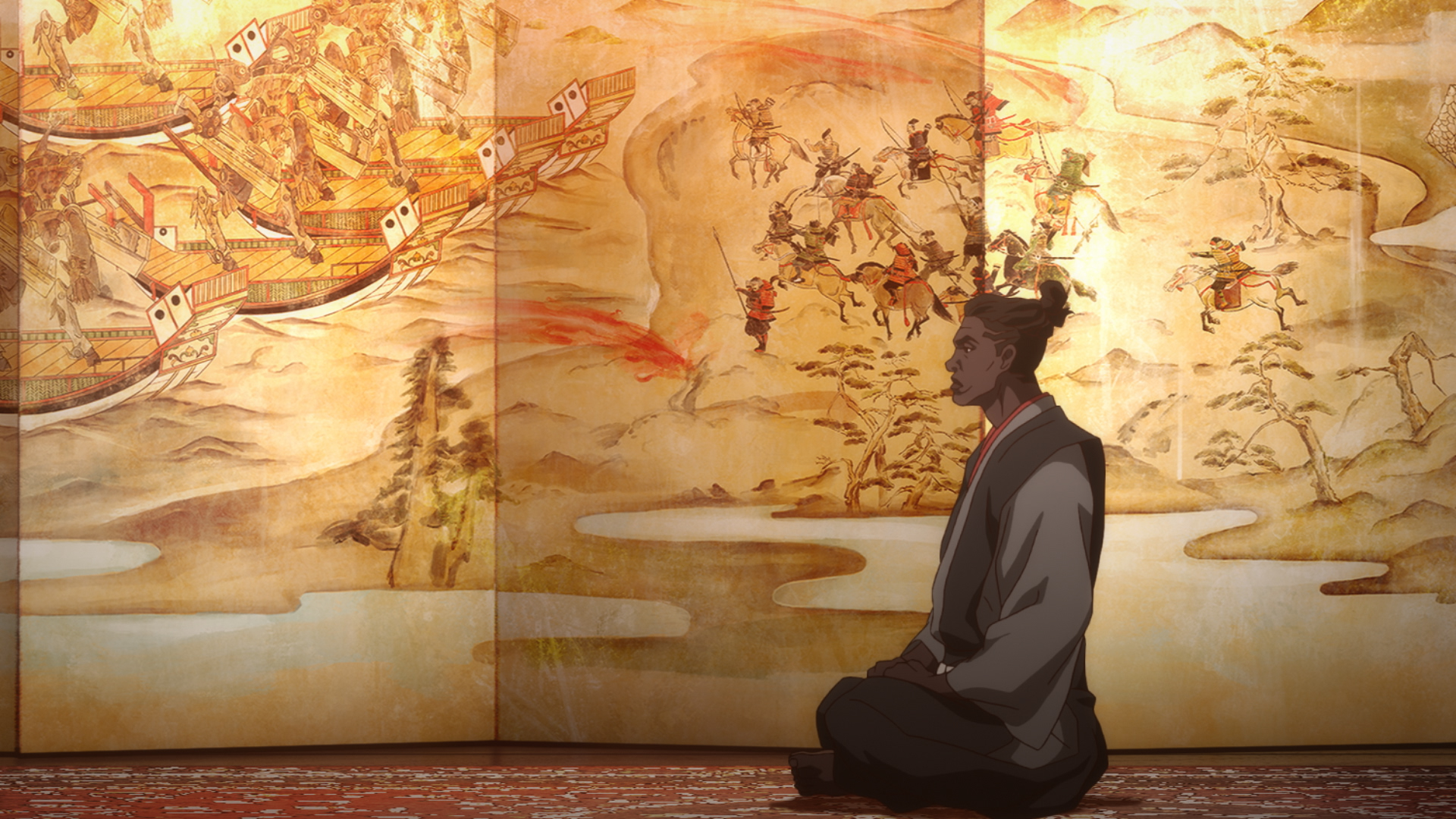What to Watch Verdict
Yaskue looks beautiful but the story occasionally under delivers .
Pros
- +
⚔️Polished animations.
- +
⚔️Sensational fight sequences.
- +
⚔️Mellow, smooth score.
Cons
- -
⚔️Disconnected emotional beats due to non-linear storytelling.
- -
⚔️Uneven character development undercuts relationship investment.
Netflix’s latest anime series, Yasuke, opens with on a battlefield full of mages, monsters, mechas, and master swordsmen set in an alternate Japan during the feudal era brought to fantastical life with striking animation by Japanese animation studio, MAPPA. Created, and directed, by LeSean Thomas, this six-episode anime series written by Nick Jonas Jr. fills-in the historical blanks with a heavily speculative - and far favorable - tale of the fate of the first African warrior-turned-samurai after witnessing the daimyō (warlord) he served commits seppuku.
20 years later, a deeply tormented Yasuke (LaKeith Stanfield) just wants to live peacefully in obscurity. He works as a boatman in a small village and drinks himself into a stupor in the hopes of outrunning his demons. He’s withdrawn and standoffish with all but the villages’ children.
While the story revolves around Yasuke, this series is about the journey this Ronin finds himself on after agreeing to ferry a mother (Gwendoline Yeo) and her daughter Saki (Maya Tanida) to a special doctor who can help her understand the magic she can barely control and is sapping her strength. But when the duo’s past catches up to them along the way, Yasuke finds himself thrust into the midst of battle that tests his will and triggers painful memories. Tragedy strikes, with chaos swiftly following. When the dust settles, Yasuke finds himself shepherding a magically unstable child through dangerous territory as secrets and new enemies dog their heels. And as their enemies get bolder expect the blood to flow, the banter to entertain, and the magical mayhem to keep things interesting.
Despite the thirty-minute episodes, Yasuke blends in the facts of how an enslaved African owned by Jesuits ends up in the service of daimyō Oda Nobunaga and ultimately trained to be a samurai in 16th century Japan into the series’ worldbuilding with a telling simplicity. With a slow and steady pace perfectly maintained by the score created by artist Flying Lotus, Yasuke’s a subtle, yet attention-grabbing, journeyman's tale. Just don't expect the villain's origins or the magic system in this world to ever be properly explained before major displays of power break out.
The overall historical setup is great but there's a few glaring missteps in the story development. Though it almost feels deliberately withheld. Given the major trauma in Yasuke's past, there should be big emotional highs and devastating lows as his history unfolds. The flashbacks do a good job of hitting the highlights but the plot focus is too narrow.
Like a lot of anime, Yasuke is a polished mix of “show and tell.” There are no wasted moments. But there a few missing one. the series has a villain whose role in Yaskue's past is poorly explained. As a result, the character development around key figures is too uneven to ensure present day reveals land with the proper amount of emotional heft. It also exposes a major issue. Stanfield’s vocal portrayal struggles to consistently evoke the right emotion and connect to his scene partners. Yaskue really needed to better connect the past to the present narratively. Without it, character and story arcs essential to investing in that relationship fall short of the mark emotionally.
Visually every scene is spot on, but Stanfield has a lack of chemistry with key characters (at key moments, like finding out he’s been double-crossed) and his often too monosyllabic delivery bleeds away needed tension and occasionally rings false. The majority of Yasuke’s character development unfolds via flashbacks; it's imperative every beat “hit” to properly understand his mental state in the present. So, while the story building is rock solid, it sometimes feels like the mood would be better maintained with the sound muted. If it weren’t for the fact that the remainder of the voice casts’ performances are in lock-step with the animation, Yasuke would be utterly missing the necessary intensity altogether.
Writer Nick Jonas Jr. deftly uses the protector and child trope to its best advantage as Yasuke and Saki grow closer, and trust becomes ever more vital to their survival. This is where the series hits is stride and some of the dialogue missteps even out. The narrative constantly dips in-and-out of the heavy moments with a touch of camp and large helpings of the weird and supernatural.
Thankfully, the chemistry between the pair continues to improve as the story progresses; largely due to Tanida’s effervescent and occasionally unholy portrayal of Saki. As Yasuke’s forced to return to his fighting ways, the action sequences and fight animation shift the intensity and carry the day. It’s obvious this is where Stanfield truly settles into the role and the character shines. Well, that and his never-ending struggle to contain one tiny girl who can knock him flat with her mind. The growing affection between Yasuke and Saki keeps this narrative on the right side of the "magical negro" trope...barely. The storyline making a point of having each rely on and teach the other saves it from wandering too close to making Yasuke matter only in relation to Saki's journey. That, coupled with the ever-evolving danger surrounding this powerful little girl keeps the narrative developing into a layered story fed by a judicious use of cliffhangers and chaotic energy.
Although the dense episodes offer more than a few dark moments, the overall narrative never loses its buoyancy. This is due, in large part, to a rag-tag ensemble of bounty hunters comprised of a werewolf woman (Julie Marcus), a scepter wielding lady assassin (Dia Frampton), a shaman (William Christopher Stephens) with a fondness for knives and summoning shadow fighters and a sentient mecha (Darren Criss) highly likely to cause as many problems as it solves. Their contributions to keeping the narrative alive can’t be overstated. As the story climbs towards its climax, their timely return rounds out the emotional beats.
It’s an absolute plus that director LeSean Thomas chooses to allow the themes and touchy cultural issues to play out casually within the story order. The inference that as a foreigner, and a Black man, Yasuke treads carefully to avoid being returned to slavery lingers subtly in the background. It's a reoccurring refrain that somehow still feels underdeveloped by the end. But, overall, avoiding heavy-handed signaling and metaphors makes the stark comment on the brutality and complexity of life and politics in feudal Japan all the more apparent through compelling visuals. Though, the homophobic inferences in an early story arc is a decidedly sour — and unnecessary — note. But it becomes clear that this story is designed to be a slow burn; always throwing out threads that can be picked up in the future. If the series has one.
The script constantly leaves space for levity, absurdity, and well placed moral lessons without losing the sense it's driving both Yasuke and Saki towards big face-offs worth all the angst and growing pains confronting one's destiny requires. Yasuke doesn’t always hit the mark when it comes to character development or tone; but with its straightforward plot, bloody fights and magical battles it definitely entertain. From the beginning of the credits to the screen fades to black prepare for a sweeping landscape full of eye-catching color, enticing details and a pair learning how not to be alone together.
No one knows what ultimately became of the real-life Yasuke but this series offers an after credits tease that offers up the possibilities for future adventures. Here’s hoping Netflix decides the world could do with more Yasuke because there will be questions it's be nice to see fleshed out in this vividly crafted world.
All six episodes of Yasuke will be available to stream April 29 on Netflix.
Ro is a Rotten Tomatoes approved film/tv critic, writer and host on several of the MTR Network's podcasts. She's a member of the San Diego Film Critics Society and the Online Association of Female Film Critics. She's a former culture columnist for San Diego CityBeat (may it rest in peace) with a serious addiction to genre fiction, horror and documentaries. You can find her sharing movie and book recs and random thoughts, on her podcast I Talk Sh!t and Read or in her newsletter, Shelf Envy.












